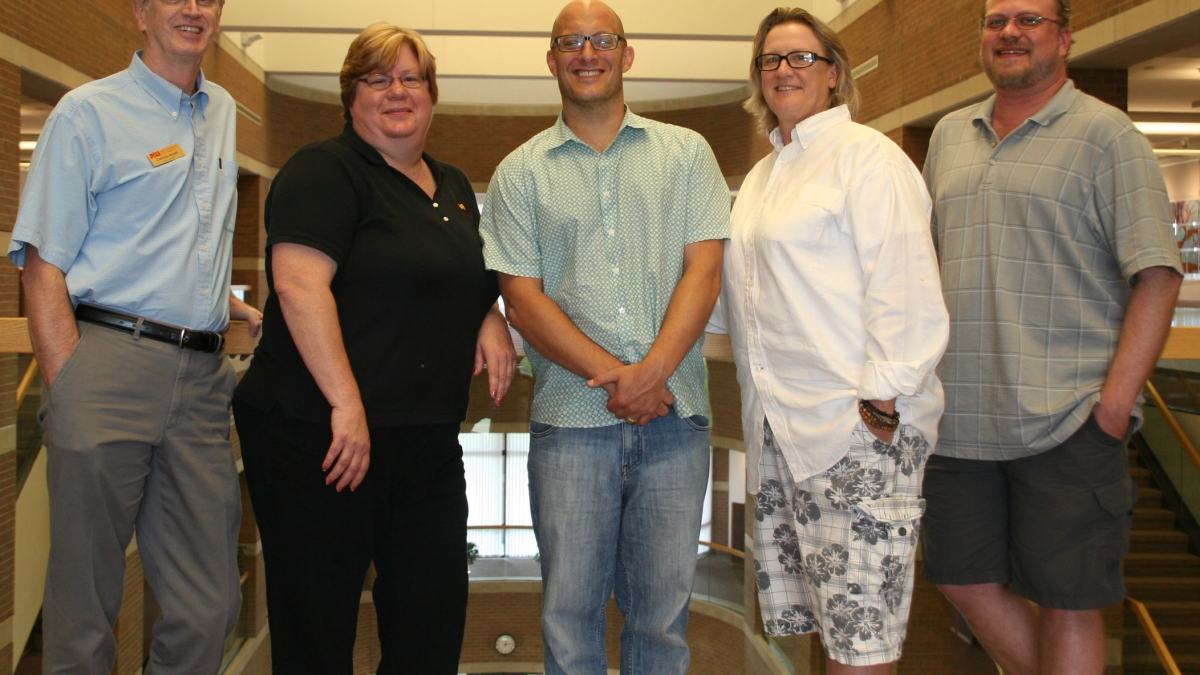Composition course stresses research on critical issues

One could easily argue that reading, research and writing form the core skill set of a high-quality university education. ASU’s New College of Interdisciplinary Arts and Sciences has embarked on a project to motivate students to fully develop this skill set during their First-Year Composition (FYC) experience, challenging first-year writing students to apply interdisciplinary research and writing to pressing local, national, and international issues.
“This strategy is in keeping with the New College mission of social engagement,” said Michael Stancliff, associate professor of English and director of first-year composition in New College, the core college on ASU’s West campus.
New FYC courses piloted this semester focus the curricular emphasis on interdisciplinary, inquiry-based research and writing. “The FYC program has really been heading in this direction for several years now,” Stancliff said. “Several of our faculty members have taught community-based courses and courses focused on social justice issue. We really see ourselves as building on existing strengths.”
Grounding this new curriculum is the online textbook New College Guide to Research and Writing. Stancliff developed this resource with Karla Murphy, a lecturer in the School of Humanities, Arts, and Cultural Studies (SHArCS); Dennis Isbell, director of Fletcher Library; senior librarian Lisa Kammerlocher; and New College technology support analyst Aaron Rostad.
“We are not really changing the heart of the FYC program,” Murphy said. “The learning goals for students in first-year composition courses remain untouched. Instead, this new curriculum offers an alternative to how students meet these goals – and that is exciting.”
Murphy said that students’ connectivity to the subject they are researching will be enhanced not just by their ability to pursue topics important in their own lives, but also by engaging with the diverse range of resources available to them at the West campus. “Our students will have the opportunity, for instance, to work with New College faculty outside of our immediate classrooms, librarians at Fletcher Library, other students, readings and research materials, interviews with experts, and faculty in the FYC program,” she said.
Isbell sees the library as playing an essential role in this effort. “Part of the mission of FYC is to introduce first year students to the methods and values of academic work,” he said. “This includes research, which is working with evidence, and interpretation of knowledge based on the evidence, which is writing. So Lisa and I were very pleased when Michael and Karla invited us to work with them on creating their new online guide.
“Michael and Karla had a framework in place that the Library could slip right into,” Isbell said. “They present reading, research and writing as a continuum of sorts, but one that goes back and forth from one to the other as students – and scholars – work through the whole process. In fact, reading, research and writing are really inextricable.”
“Working collaboratively has been the most exciting part of this project,” Stancliff said. “Many different areas of expertise have been brought to the task of writing the New College Guide.”
Stancliff and Murphy have been teaching pilot sections of FYC courses this year using the New College Guide. They identify several features of it as distinctive, chief among them a central focus on student-driven inquiry. An entire chapter of the New College Guide is dedicated to guiding students in reflecting on their interests and the issues that emerge as important in their home communities. Other innovative features include an integrated approach to research, reading, and writing and an introduction to interdisciplinary methods. In this way, FYC will increasingly serve as a gateway to the intellectual life of New College.
“Ultimately, I would say that our goal in these courses is to produce not only students who are articulate in skills associated with rhetoric and composition, but to create lifelong learners skilled in seeing and appreciating multiple points of view in order to make sense of their own worlds,” Murphy said. “This may seem like a tall order, but Michael and I agree that skills associated with reading, writing, and research can truly be that transformative.”
Marlene Tromp, director of SHArCS, believes the new FYC program will help students discover how profoundly relevant their ASU education is to their lives, their futures, and their community.
“This new curriculum is an exciting innovation that challenges our students and helps to them reach outside of the classroom, making an impact there as well,” Tromp said. “When students become aware of how their writing can be a part of changing the world around them, it empowers their growth and benefits our society as a whole. Writing at New College will dynamically embody the goals of the New American University – enabling student success, transforming society, and being socially embedded.”
“Scholarly conversations about interdisciplinarity are often highly theoretical and can be hard to understand if you’re not steeped in the theory,” Stancliff said. “The model of interdisciplinary research and writing we are presenting holds to a principle that is relatively simple but powerful in the context of inquiry-based writing. We present the disciplines as intellectual resources for real-world problem solving. Complex social situations demand a diversity of approach and a creative combination of perspectives and methods.”
The New College Guide challenges students to develop sophisticated research questions, something first-year students are not typically asked to do. “We like to tell students that in their schooling prior to the university, they probably became very skilled at answering questions. The challenge now is learning what questions most need asking,” Stancliff said.
In this challenging work, first-year writing students will have the opportunity to work with New College faculty from across disciplines who will engage with the research of individual students as Faculty Writing Mentors. “I am grateful for the generous and enthusiastic response of New College faculty who are willing to serve as Faculty Writing Mentors,” Stancliff said. “This kind of interaction with the talented scholars on this campus will greatly enrich the learning of our FYC students.”

